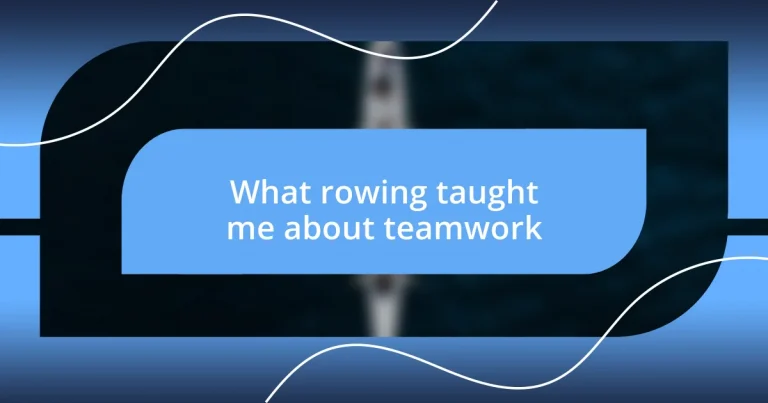Key takeaways:
- Effective communication and listening are crucial for synchronizing efforts and fostering teamwork in rowing, enhancing both performance and morale.
- Building trust through vulnerability and shared experiences strengthens team bonds and cultivates an environment of support and accountability.
- Setting shared goals and adapting to different roles promotes collaboration, ensuring every team member feels valued and contributes to collective success.
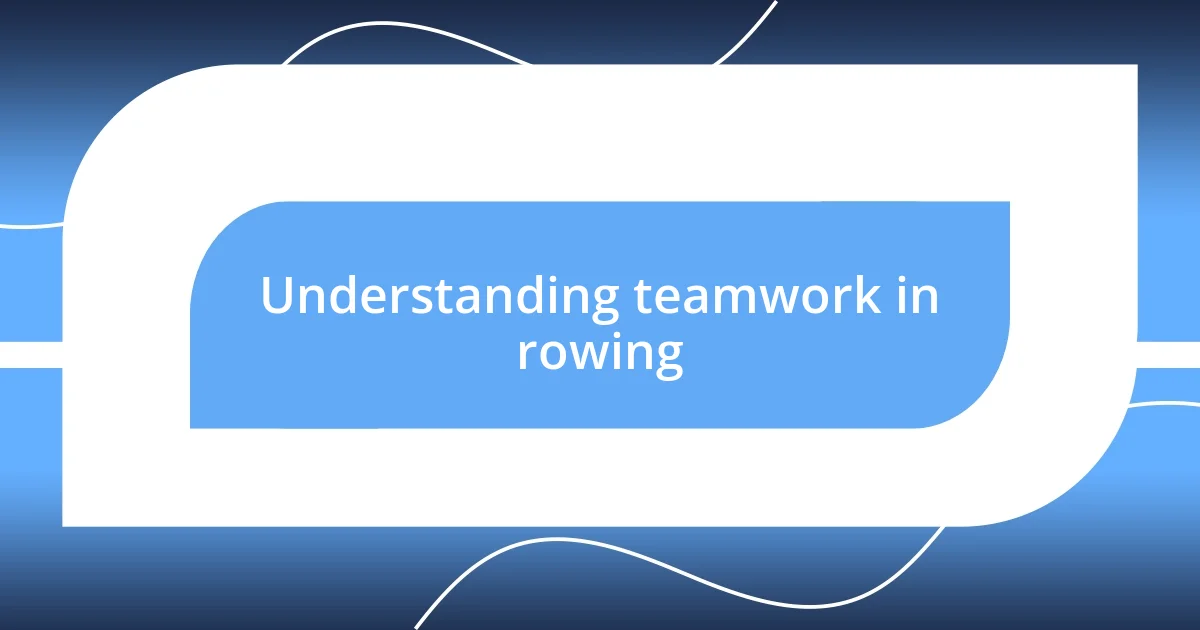
Understanding teamwork in rowing
Rowing is a unique sport that crystalizes the essence of teamwork in ways other activities might overlook. I remember the first time I stepped into a boat, eyeing my teammates with a mix of anticipation and anxiety. How could we, just a group of individuals, somehow synchronize our efforts to move as one body through the water? Each stroke in rowing isn’t just about personal strength; it’s about aligning our timing, rhythm, and focus with each other.
The emotional connection among teammates deepens as you share both the struggles of early morning practices and the joy of hard-won victories. I recall a particularly grueling session where we didn’t seem to hit our stride. Frustration bubbled around, but the moment we shifted our focus to encouraging one another—it was like flipping a switch. Suddenly, we were not just eight rowers but a united front pushing through barriers together. Isn’t it fascinating how adversity can reveal the strength of collaboration?
Listening and communication are foundational in rowing, teaching me that even slight misalignments can affect the entire crew. I learned to be aware not only of my own technique but also of my teammate’s cues. Have you ever noticed how a shared glance or a unifying shout can elevate a team’s spirit? For me, these moments underscored that trust and openness are crucial; they create an environment where everyone feels valued and accountable. This dynamic transforms an ordinary rowing experience into an extraordinary journey of collective achievement.
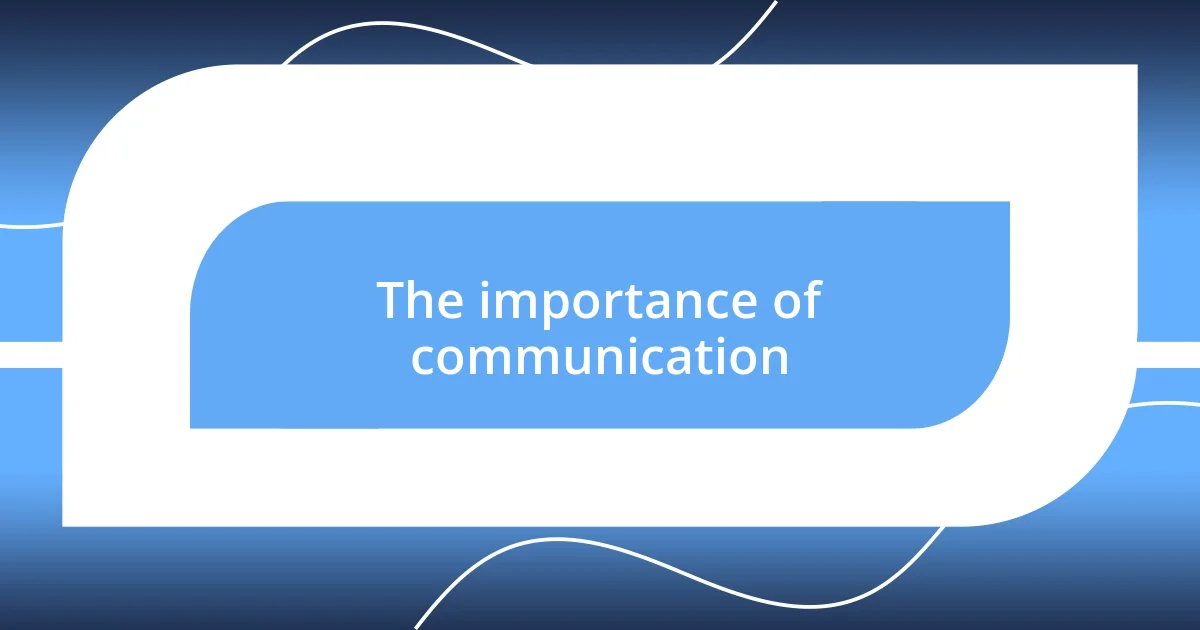
The importance of communication
Effective communication is the lifeblood of any rowing crew. I remember one chilly morning when the water was particularly choppy. Our coach shouted from the dock, urging us to listen closely to one another. That day, it became crystal clear: our verbal exchanges were not just commands; they were a vital lifeline that kept us in sync. When one rower spoke, it was as if a ripple of energy went through the boat. Communication creates urgency and fosters an atmosphere of shared commitment.
To emphasize further, here’s how communication influences teamwork in rowing:
-
Clarity of Roles: Each team member knows their responsibilities, leading to a more organized and efficient effort. I recall how clearly defined roles helped the eight of us mesh as a unit during races.
-
Immediate Feedback: Real-time communication allows for on-the-spot adjustments. I can still hear my teammate’s encouraging shout, “That’s it, just a bit tighter!” which pushed me to improve my stroke.
-
Boosting Morale: A well-timed word of encouragement can elevate everyone’s performance. I distinctly remember a race where our coxswain’s rallying cry made us dig deeper and pull harder.
-
Problem-Solving: Open lines of communication help address issues swiftly. When we struggled with coordination, discussing our concerns together helped us find solutions that improved our overall performance.
Through every stroke, I’ve come to appreciate that communication is not merely about relaying information; it’s about building a cohesive unit that thrives on trust and understanding. It’s remarkable how a few words can unite a group, turning individual effort into a powerful collective force.

Building trust among teammates
Building trust among teammates is essential for any successful rowing team. I vividly recall a moment during a particularly intense practice session. We found ourselves at odds, struggling with synchronization. In that moment of tension, I decided to open up about my own challenges. To my surprise, my vulnerability sparked a wave of honesty among my teammates. Everyone began sharing their thoughts and feelings, and just like that, the air lifted. Isn’t it interesting how sharing weaknesses can build a bridge of trust?
Trust, in my experience, often grows in the quiet moments between the strokes. I remember post-practice discussions where we would celebrate our small wins and discuss what went wrong. This wasn’t just a recap; it was a bonding session where we learned from one another and reinforced our commitment to the team’s success. Those moments helped cultivate a safe space where we felt free to express ourselves. They made me realize that trust isn’t merely built on victories but through reflective conversations.
When I think back to our hardest races, what stands out isn’t just the exertion we felt but the trust we had in each other. I still remember how, right before one crucial race, we formed a circle on the dock and shared our intentions and fears. It was electrifying. As we each spoke, I noticed how our connection deepened, creating an unshakeable bond that propelled us through the water. How do you foster that trust in your teams? I believe it starts with vulnerability and open communication—elements that make each teammate feel integral to the group’s success.
| Aspect of Trust | Personal Experience |
|---|---|
| Vulnerability | Sharing my struggles led to open dialogue among teammates. |
| Reflective Conversations | Discussions after practices helped us connect and learn from each other. |
| Crisp Communication | Expressing intentions and fears formed a powerful bond before races. |

Setting shared goals for success
Setting shared goals for success is a critical ingredient in the recipe of effective teamwork. I’ll never forget the powerful moment when we set our sights on winning a regional championship. Instead of keeping our goals to ourselves, we sat in a circle and discussed what each of us wanted to achieve. This wasn’t just about medals; it was about personal growth and team cohesion. We agreed that every practice, every stroke, counted toward that collective aspiration. Doesn’t it feel empowering when everyone is on the same page?
Once we established our shared goals, it created an unshakable sense of accountability among us. I recall a day when I struggled with my technique, and instead of retreating, my teammates rallied around me, reminding me that our success depended on lifting each other up. It’s fascinating how setting common objectives transforms competition into collaboration. Do you remember a time when your own aspirations synced beautifully with others? That synergy fuels motivation and makes the climb toward success feel less daunting.
In practice, we would often revisit our goals, adjusting as necessary, and I found this dynamic really strengthened our bond. The more we articulated what success meant for us, the more we committed to supporting each other’s journey. I can still hear our mantra echoing in my mind: “Together, we rise.” It’s not just about crossing the finish line first; it’s how we grow as a unit along the way. What if we all approached our endeavors with such clarity and shared purpose? Imagine the impact that could have!
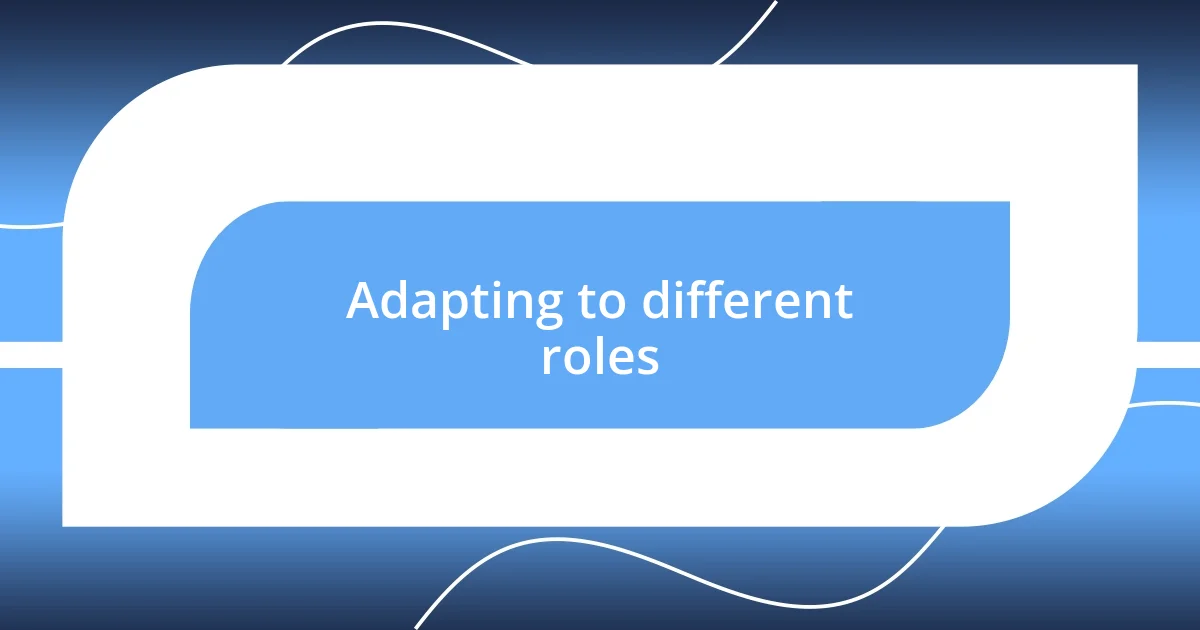
Adapting to different roles
Adapting to different roles on the rowing team was a lesson in flexibility and empathy. I remember the day I found myself in the unfamiliar position of being the coxswain. I had always been a rower, but now I had to lead and guide my teammates from a different perspective. It was nerve-wracking, yet invigorating. I learned that understanding each member’s strengths and weaknesses was crucial. Isn’t it fascinating how stepping into another’s shoes can deepen your appreciation for their contributions?
In another instance, during a particularly grueling season, one of our strongest rowers was sidelined by an injury. This forced me to shift from my comfort zone to cover her role. I had to recalibrate my approach, and it was a real challenge. Working on her technique, I began to understand the rhythm I had taken for granted. Have you ever had to adapt when a teammate couldn’t be there? That experience taught me the importance of versatility; it highlighted how every role, no matter how small, matters deeply in the grand design of success.
Finally, I recall an intense practice where we rotated positions. Each of us embodied a different role, whether it was rowing in the front, back, or coxing—the perspective shift was eye-opening. I realized how the dynamics of the crew changed with each variation. What I once considered my area of expertise was now laced with new challenges. Is there a role you’ve tried that completely changed your view? Embracing these different roles not only enhanced our teamwork but also built trust as we saw each other in new lights. It’s powerful to realize how adaptability can become a cornerstone for growth in any team setting.
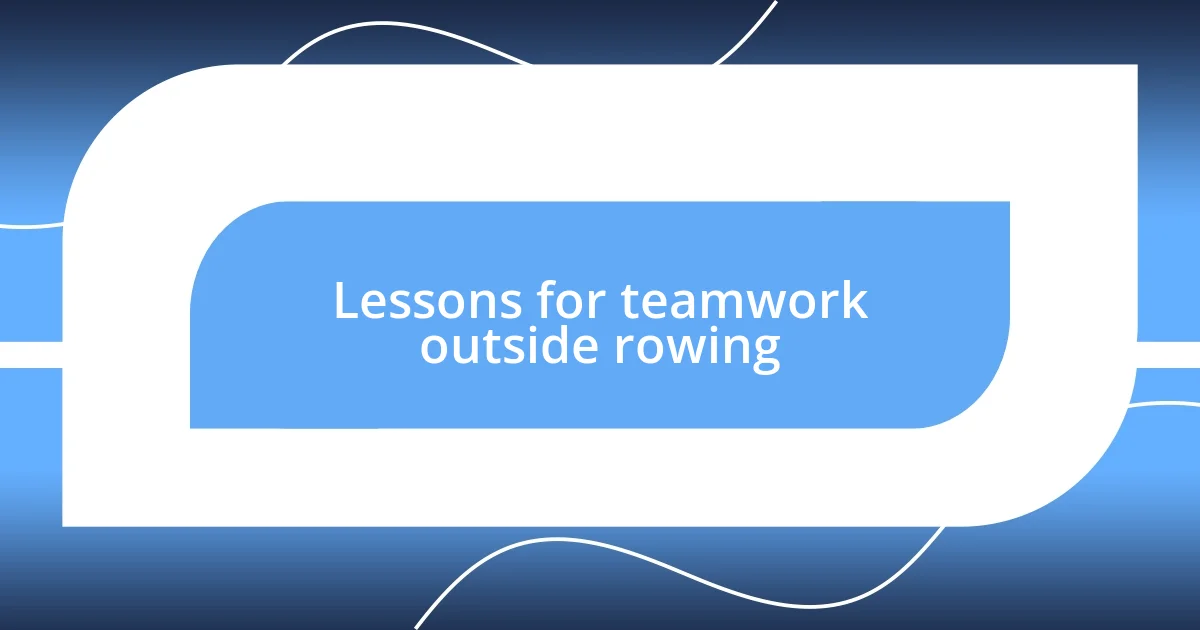
Lessons for teamwork outside rowing
Understanding diverse perspectives is critical in any team environment. One memorable instance for me was during a community service project where our roles shifted from organizers to participants. Initially, I was in charge of coordinating tasks, but midway through, I found myself sweeping floors alongside volunteers. It was an eye-opener; I gained insights into the challenges and triumphs each member experienced. How often do we get so caught up in our roles that we overlook the contributions of others? This experience reinforced my belief that appreciating everyone’s input fosters a stronger unit.
Communication, too, plays a pivotal role beyond the water. I recall a brainstorming session with colleagues where we encountered a particularly tough project. Instead of sticking to our usual dialogue, we embraced open conversations, ensuring every voice was heard. It unlocked innovative ideas and made each person feel valued. Have you ever noticed how sharing thoughts can dissolve barriers? By creating an environment where everyone felt comfortable speaking up, we transformed conflict into collaboration, leading to a richer outcome.
Finally, there’s the undeniable importance of trust. In rowing, if I don’t trust my teammates, we falter. I experienced this firsthand when leading a group in a local charity marathon. I had to rely heavily on my teammates’ pacing and support, painting a clear picture of how trust transforms individual efforts into collective success. Have you ever found yourself in a situation where trust made all the difference? It seems that when trust is established, teams can overcome any obstacle, just as we did during that race, crossing the finish line hand in hand, knowing that each member had our backs.












